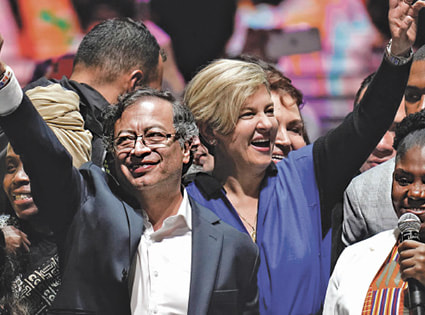Colombia: an opportunity for peace and prosperity
Gustavo Petro’s victory in the Colombian presidential election opens multiple expectations. The country is torn between progressives, who look to the future with optimism, and conservatives, who fear a left-wing populist drift towards a communist dictatorship. But Colombian political analyst Victor M. Uribe-Uran, a professor at Florida International University, believes that Petro’s coming to power is “an opportunity for peace and prosperity.”Víctor M. Uribe-Urán is not a partisan militant. He is a renowned associate professor of History and Law at Florida International University (FIU), in the southern part of the state.
He is also a political analyst. With a dispassionate and academic mentality, Uribe-Uran tells Sol de Medianoche that “all Colombians, including those of us in the diaspora (2,869,032 in 2020, according to the UN) have the right to hope, and Petro represents that hope.” Of these nearly three million Colombian emigrants spread around the world (mainly Venezuela, the United States and Spain), those currently residing in Alaska barely nine hundred (867, according to the 2020 census.) Uribe-Uran assures that “Petro wants to lead a government of the center to undertake a series of reforms aimed at social justice and poverty reduction. Proof of this are his appointments of ministers, moderate and of great prestige, such as José Antonio Ocampo in Finance and Public Credit or Alejandro Gaviria in Education.” For Professor Víctor M. Uribe-Urán, “those who remember Petro’s guerrilla past ignore that he has been fully integrated into democratic political activity for thirty years now, and that Petro can now be as Lula in Brazil or Pepe Mújica in Uruguay were before.” “Why associate Gustavo Petro to Venezuela’s Nicolás Maduro and not to Lula or Mújica? Since his triumph in the presidential elections, Petro has not ceased to show signs of moderation and political balance. We must keep a prudent period of observation of his movements and decisions before judging him, because what some are doing now is putting their ideological prejudices before a dispassionate opinion based on data and concrete facts.” What is more: Gustavo Petro has not even begun to serve as president. He will do so when he takes office next Sunday, August 7. And he will be accompanied by Francia Márquez, who will become the first black woman to take office as vice president of the country. Resuming relations with Venezuela, redefining those relations with the United States (especially because of the Free Trade Agreement), Russia and China and consolidating the excellent relations with Spain and the European Union are some of the great challenges that await Petro as the new president of Colombia. Achieving all this, while maintaining a balance, is the real challenge facing the country. Also reorienting and “de-fossilizing” energy policy, promoting renewable energies (even though the country is rich in oil) and contributing to the fight against Climate Change. |
